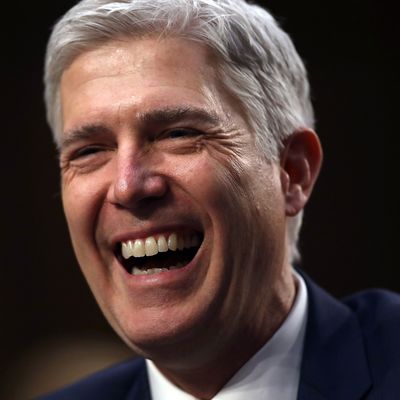
In a vote foreordained by Senate Republicans’ use yesterday of the “nuclear option,” which changed the upper chamber’s rules and allowed cloture on Supreme Court confirmations by a simple majority, Neil Gorsuch won the seat on the Supreme Court that has been vacant since Antonin Scalia’s death over 13 months ago. After preventing Barack Obama from filling the opening with his appointee Merrick Garland, and giving Donald Trump a sweet plum to offer Court-obsessed conservative ideologues, Republicans for once hung together. All 51 GOP senators present (Johnny Isakson was out recovering from surgery, though he did make it to the crucial “nuclear option” vote) voted to elevate the Tenth Circuit Court of Appeals judge. Democrats from three very red states — Joe Manchin of West Virginia, Joe Donnelly of Indiana, and Heidi Heitkamp of North Dakota — also voted for Gorsuch. A fourth Democrat who voted against filibustering his home-state judge, Michael Bennet, in the end voted against his confirmation.
And so, abetted by a lot of rule-breaking, Gorsuch will join the Court as soon as he can be sworn in, and will likely be present when all nine Justices hold a crucial conference next week to determine which cases they will hear during the fall term. There’s also one more round of oral arguments scheduled for April 17 on cases already pending.
There will be three separate types of fallout from the Gorsuch-confirmation fights to watch in the days just ahead. The first will be determining his impact on the Court, particularly in cases where SCOTUS has been deadlocked by 4-4 votes. The second involves the other big shoe that will drop if there is a second opening on the Court during Trump’s first (and possibly last) term. And the third is the continued erosion of Senate traditions, with the filibuster now gone for all Executive and Judicial confirmations, while remaining for regular legislation. Will the Senate hold the line on rules changes, or could the filibuster be killed altogether in the near future?
Preoccupation with the missile strike on Syria may displace some post-Gorsuch speculation. But the confirmation fight remains an important long-range development, and for the time being, the only tangible accomplishment of the GOP “trifecta” regime elected last November.






























